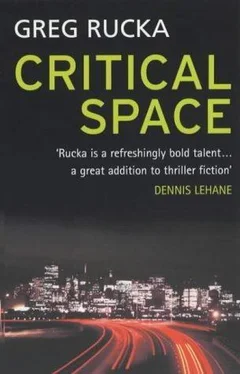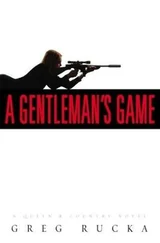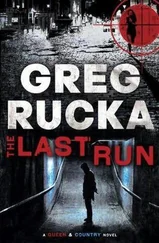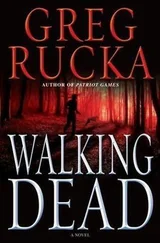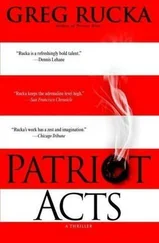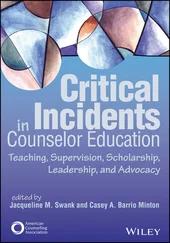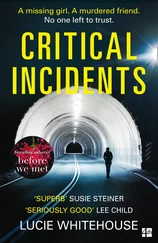Greg Rucka - Critical Space
Здесь есть возможность читать онлайн «Greg Rucka - Critical Space» весь текст электронной книги совершенно бесплатно (целиком полную версию без сокращений). В некоторых случаях можно слушать аудио, скачать через торрент в формате fb2 и присутствует краткое содержание. Жанр: Триллер, на английском языке. Описание произведения, (предисловие) а так же отзывы посетителей доступны на портале библиотеки ЛибКат.
- Название:Critical Space
- Автор:
- Жанр:
- Год:неизвестен
- ISBN:нет данных
- Рейтинг книги:4 / 5. Голосов: 1
-
Избранное:Добавить в избранное
- Отзывы:
-
Ваша оценка:
- 80
- 1
- 2
- 3
- 4
- 5
Critical Space: краткое содержание, описание и аннотация
Предлагаем к чтению аннотацию, описание, краткое содержание или предисловие (зависит от того, что написал сам автор книги «Critical Space»). Если вы не нашли необходимую информацию о книге — напишите в комментариях, мы постараемся отыскать её.
Critical Space — читать онлайн бесплатно полную книгу (весь текст) целиком
Ниже представлен текст книги, разбитый по страницам. Система сохранения места последней прочитанной страницы, позволяет с удобством читать онлайн бесплатно книгу «Critical Space», без необходимости каждый раз заново искать на чём Вы остановились. Поставьте закладку, и сможете в любой момент перейти на страницу, на которой закончили чтение.
Интервал:
Закладка:
Which left one thing.
I picked up the gun. The Walther P88 is a very nice, very expensive semiautomatic pistol that was originally designed to be a potential replacement for the M1911 Colt, the tried-and-true sidearm of the U.S. Army. It did quite well in its trials but failed the adverse-conditions test, where the military likes to bury, freeze, burn, drop, crush, and otherwise torture equipment. Even so, the Walther's considered by many a pistol aficionado as one of the finest combat pistols ever produced. It's a fully ambidextrous gun, meaning that the magazine release and decocking levers are mirrored on both sides.
The magazine was full. I slipped it back into place and racked the slide, putting a round into the breech. Then I raised the gun.
"I wouldn't," she said, lowering the book.
"Sure you would."
She gestured off to her left, my right. "You'll have to kill him, too."
I glanced down, saw that the Doberman had moved soundlessly to my side, and was now in a crouch, prepared to spring. His lips were back, and his fur was up, and he should have been growling but he wasn't, and the scar at his throat finally made sense.
"Call him off," I said.
"Or what?"
"It's a double-action. I don't even have to cock it. Call him off."
She used the flap of the book jacket to mark her place, then set the book beside her empty coffee cup. As she poured from the French press, she said softly, "Miata, tovarisch."
The Doberman's lips fell back around his teeth, and he moved back to her seat, then lay down once more beneath the table.
She picked up her cup. "You haven't tried the muffins."
"I'm not certain I trust your food."
"But you trust the drink."
"No. I was thirsty."
The corner of her mouth curled gently.
"What did you spike my OJ with, by the way?" I asked.
"Interferon."
"Made me good and sick."
"I wanted to slow you down, then. I don't now. I left the gun out so you would not be afraid."
"It's working," I told her. "Where are we?"
"This is my home."
So we were in the Caribbean. It had been one of the last things she'd said before trying to kill Pugh, her voice calling through the barricaded door, where Dale and I had retreated with our principal, trying to buy time for Natalie and the others to arrive. Drama had used an explosive, set it against the wall in a final attempt to blow us up. Just before she'd armed the device, she'd talked of pineapple muffins and Bequia.
I indicated the muffins with my chin. "These the ones you were talking about?"
It pleased her that I had remembered. I didn't tell her I'd searched through two atlases before I'd found Bequia on a map. It was part of the island nation of St. Vincent and the Grenadines, nine miles south of St. Vincent itself, about a hundred miles west of Barbados, and I'd never heard of it until she'd mentioned it that day. I'd had a hell of a time finding out anything more about the island other than the location. Settled by the English and the French, it had been an independent member of the British Commonwealth since 1979. It was off the major tourist track, and its main industries were fishing and boatbuilding. Mostly the harbor served visiting yachts. Apparently there was a regatta of some sort every Easter.
"You never told them," she said.
"No."
"I thought that perhaps you'd forgotten, or misunderstood."
"I understood." My arm was getting tired, and I couldn't see myself shooting her in the next few minutes, so I set the Walther down on the table but kept my hand on it.
I asked, "How long was I out?"
"Five days. I injected you with Ketalar, then used an IV to keep you nourished and hydrated during the journey. The hallucinations only occurred when you were regaining consciousness, which you did twice before we got here." She put her elbows on the table and crossed her hands under her chin, and I realized she wanted to keep talking, that there probably weren't that many people she got to tell about her work. "Would you like to know how I moved you?"
"Oh, absolutely."
"I had a boat waiting up the Hudson. When you lost consciousness, I moved you aboard and took you to Brooklyn, where I transferred you to another boat, a 38 Scarab AVS. Then we went down the coast. We stopped to refuel in Virginia Beach, Charleston, Nassau, Cockburn Harbour – in the Turks and Caicos – then again in Tortola in the U.K. Virgin Islands, before reaching Kingstown in St. Vincent. The journey took just over four days."
"You manned the boat yourself?"
"No, you had to be monitored, the boat had to be controlled, and I had to sleep."
"Was it Dan? Danilov?"
She nodded.
"Did you kill him?"
Her chin came off her hands and she sat back, and either she really was indignant or she was damn good at faking it, because she looked both hurt and appalled. "Dan is my friend. There was no need to kill him."
"You let him come all the way here?"
That clarified the question for her, and she nodded, understanding me. "You and I left him in Kingstown, with the boat. No one knows I am in this place."
"But me."
"But you."
I felt the gun under my hand, the grip beneath my fingertips. There's a gag used in the military a lot, so much so that it's worked into the popular culture, as a way of evading an uncomfortable question, a way to avoid divulging a secret.
I could tell you, I thought, but then I'd have to kill you.
So maybe the gun was to be used on me, after all.
"I am not going to kill you, Atticus," she said, reading my mind. "You could leave here now. The magazine is loaded, and the gun is ready. If you were to raise it and shoot, I could not escape with my life."
"There's your dog."
"We both know that Miata is a very particular kind of threat, and one that would not stop you."
For a moment, I considered doing it. Wrapping my fingers around the butt, raising the gun and pulling the trigger, punching her out of her chair with the force of two bullets. By the time the Doberman had gotten in position to take my throat, I could put him down, too.
I considered it.
"Maybe it's time you told me why I'm here," I said.
Chapter 2
She didn't know her real name, the one she'd been born with. At the orphanage in Magadan, she'd been called Alena. Alena Cizkova. But because Oksana Zurkowska had read a book on Egyptian mythology, and because in that book there were pictures, and because Oksana thought the picture of Osiris's bride bore a slight resemblance to the small girl she liked to tease, the other children in the orphanage called her Isis.
She'd been put in the orphanage quite young, she told me, and all she knew of her parents was that they must have both been negligent. She remembered being perhaps only two years old and a man with a beard putting his cigarettes out on her back. She didn't know why he did this, and she thought that perhaps the man was her father.
Then the State came and took her to the orphanage, and she stayed there until she murdered Oksana.
"I had wanted her dead," she told me, "the way that children want their tormentors dead, and so I plotted it, and so I stole her life."
It was the shirt that had given her away. The old drunk who tended the boilers in the orphanage basement saw her trying to stuff it in the furnace, and he had stopped her and seen the blood, and had held her while a search was made for Oksana. When the girl's body was found, one of the wardens beat Alena in the body until blood came out of her mouth. Then the police were called.
She said they questioned her for several hours and that she didn't say a word. She was placed in a cell with men three and four times her age.
When she got to that part, she bent to pet the dog. After several seconds, she added, "That was a bad night. I will never allow another night like that."
Читать дальшеИнтервал:
Закладка:
Похожие книги на «Critical Space»
Представляем Вашему вниманию похожие книги на «Critical Space» списком для выбора. Мы отобрали схожую по названию и смыслу литературу в надежде предоставить читателям больше вариантов отыскать новые, интересные, ещё непрочитанные произведения.
Обсуждение, отзывы о книге «Critical Space» и просто собственные мнения читателей. Оставьте ваши комментарии, напишите, что Вы думаете о произведении, его смысле или главных героях. Укажите что конкретно понравилось, а что нет, и почему Вы так считаете.
